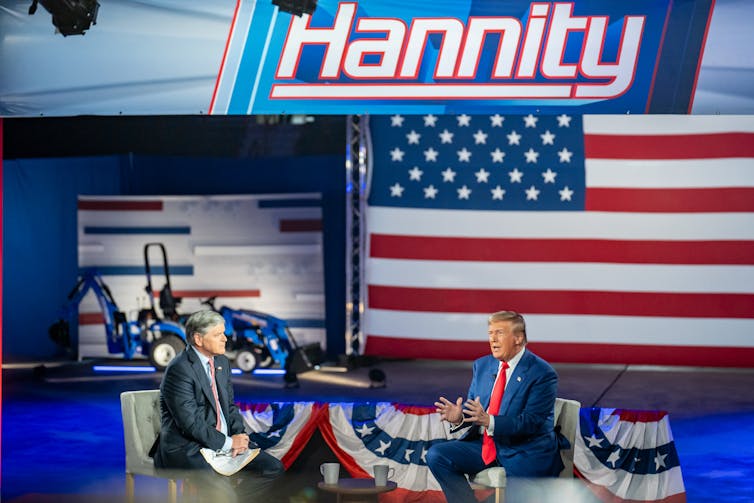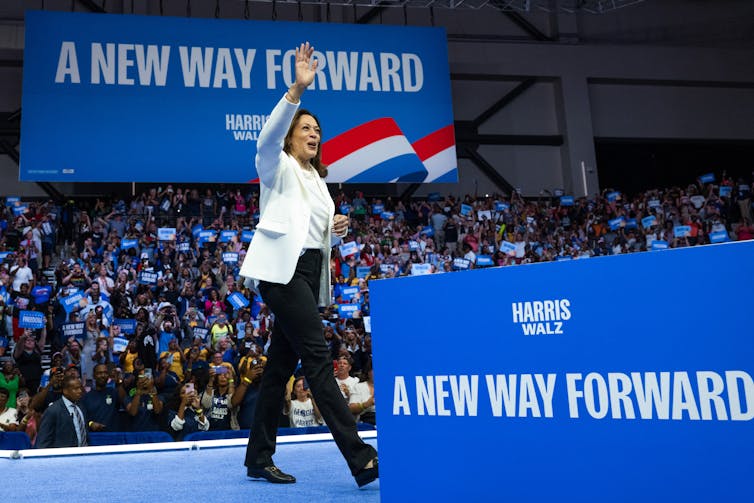
By Jonathan Schulman
Presidential candidates talk about national decline while campaigning. A lot. This was front and center during the June 2024 debate between former President Donald Trump and President Joe Biden.
“Throughout the entire world, we’re no longer respected as a country,” Trump said, as he has repeatedly.
Trump continued by saying that if the United States had a president that Vladimir Putin respected, “he would have never invaded Ukraine.” Trump said “we’re laughed at” and that “the United States’ reputation under this man’s leadership is horrible.”
Biden countered Trump’s evocative statement with the argument that the U.S. has “the finest military in the history of the world” and that it remains well respected abroad.
“The idea that somehow we are this failing country,” Biden said, “I never heard a president talk like this before.”
Public polls on other countries’ views of the U.S. support Biden’s point.
Yet politicians’ warnings of decline persist because they invoke fear for the country’s security, anxiety about another country gaining more power and anger about the United States’ various problems.

Nathan Morris/NurPhoto via Getty Images
Messages of decline over the years
While Trump’s messages of American carnage are dramatic, exchanges of this sort are not uncommon in U.S. politics.
During the 1960 presidential election, for example, John F. Kennedy, then a U.S. senator from Massachusetts, frequently warned that the U.S. was falling behind the Soviet Union, in everything from space exploration to international respect.
“I don’t want historians, 10 years from now, to say these were the years when the tide ran out for the United States,” Kennedy said during his first televised debate against his Republican opponent, Vice President Richard Nixon, on Sept. 26, 1960.
Warning of national decline has remained a common campaign message ever since, with the challenging party’s side claiming that the country is falling behind or losing respect, forcing the incumbent’s side to play defense.
Pushing back on messages of decline
My research examines the role of perceived threats to national status in domestic and international politics. I ran an experiment in March 2024 with 1,079 Americans, aimed at trying to understand how their concerns about national decline affect their foreign policy opinions.
One-third of respondents were randomly assigned to read a prompt warning that experts and leaders from both parties agreed that the U.S. was declining, relative to its rivals. Another third of respondents read the opposite message, which listed facts from bipartisan experts arguing that concerns about national decline were overblown. The final third read about a topic unrelated to politics.
Those who read about American decline reported increased levels of fear, anger and anxiety than the group who did not read about this topic. One respondent, for example, wrote, “My biggest concern is other countries won’t respect us. Once we show weakness, other countries will try to overtake us.”
However, the text of bipartisan experts arguing that the U.S. was not declining did not assuage Americans’ anxieties.
Approximately 30% of people, both liberal and conservative, who read that experts said the concerns over national decline are overblown outright rejected the premise of the text, compared with just 11% of those who read that U.S. global standing is declining.
Some respondents asked if the text was a joke and said that the U.S. is becoming a “third-world country.” Others pointed to the state of U.S. health care or reproductive rights to question how one could suggest that the country is not falling behind.

Saul Loeb/AFP via Getty Images
Fighting emotion with emotion
When the Democratic ticket changed and Biden announced in July 2024 that he would not run for reelection, the political messaging of Democratic leaders did, too.
Democratic presidential nominee Kamala Harris and her running mate, Tim Walz, have, at times, incited fear about what a second Trump term would look like. But they have also used language and talked about topics that center on joy and excitement, celebrating things like Walz’s tenure as a teacher and football coach and the pride Harris has for her mother’s work and sacrifices.
“Guided by optimism and faith,” Harris said in her nomination speech in August 2024, she encouraged her supporters to “write the next great chapter in the most extraordinary story ever told.”
Harris has also provided an emotionally powerful counter to Trump’s “Make America Great Again,” in the form of “Not Going Back.”
In Walz’s first appearance as the Democratic candidate for vice president on Aug. 6, he thanked Harris for “bringing back the joy.” With rallies filled with boisterous call-and-responses and chanting, Harris has seized on joy and excitement in detailing a vision of America’s future, juxtaposing her rallies with what she described as Trump’s “the-world-is-doomed rallies.”
The subtitle of one Harris campaign press release following a Trump news conference, for example, read: “Split Screen: Joy and Freedom vs. Whatever the Hell That Was.”
US global standing in 2024 campaign
While Harris’ rallies have largely focused on domestic issues like abortion rights and economic inequality, debates over the country’s global standing will reemerge and persist. In an August 2024 poll, the second-most-common reason likely Harris voters said they supported her was because she would strengthen the United States’ status in the world – while the second-most-common reason other voters opposed her was because they thought she would weaken the country on the global stage.
Trump has continued to describe the U.S. as a “nation in decline.” Harris, in her Democratic National Convention speech, countered that she will work to ensure that “America, not China, wins the competition for the 21st century and that we strengthen, not abdicate, our global leadership.”
Harris also remarked in her acceptance speech: “You know, our opponents in this race are out there every day denigrating America, talking about how terrible everything is. Well, my mother had another lesson she used to teach: Never let anyone tell you who you are. You show them who you are.”
Campaign rhetoric warning of American decline has been common since at least 1960, and it isn’t going away anytime soon. But with a new Democratic ticket and a transformed race, Democrats are now fighting emotion with emotion. And that is more likely to resonate than informing people that things are not as bad as they fear.
![]()
Jonathan Schulman is a Postdoctoral Fellow at the University of Pennsylvania.





























Sebelius Monfried VI says
This article, at best, only touches on a few of the influences regarding the profound dependency American voters have on emotional expressiveness as opposed to reason and logic. Let’s look back in time to see how this notion developed. In “Democracy in America” (1835) Alexis de Tocqueville wrote, American “life is so practical, so confused, so excited, so active, that little time remains for them for thought… in no country in the civilized world is less attention paid to philosophy than in the United States.” In such a milieu, What hope did reason have as a mainstay for political discourse? Of course, there were exceptions, including the Federalist Papers, Ralph W. Emerson, and The Lincoln-Douglas debates, but they didn’t set the standard.
The premise that the existing addiction to emotionally intensive politics began in 1960 is a reflection that more sophisticated marketing and advertising techniques attuned to feelings were influencing political messaging at that time as opposed to the dawning of a new age. The fix was in way before that point. Indeed, consider Jean J. Rousseau’s essay, “Discourse on Inequality Among Men” (1755) in which he attacked reason, science, and advancement in general: “Although men with minds like that of Socrates may be able to acquire virtue by reason, the human race would long since have ceased to exist if its preservation had depended only on the reasoning of its members.” This is reminiscent of James Carville’s mandate to Clinton — a brilliant yet flawed politician — to dumb it down so the folks would grasp the meaning.
The truth is that Americans never felt entirely comfortable with intellectually inclined politicians, in part because they are intimidating. They know stuff that the unwashed masses don’t but should, and that’s discomforting. Even Woodward Wilson, seemingly the most intellectual president of the 20th century, was considered a poser by John M. Keynes in “The Economic Consequences of the Peace” when the two sat on a commission to resolve the end of WW1. What’s been the pressing question concerning prospective candidates for President in the modern era? Would you like to have a beer with him? And if so expect abundant levels of congeniality and dad jokes. Ha Ha; this is our guy!
Considering this state of mind a Presidential candidate would be remiss in not addressing the emotional aspects of each respective issue. Otherwise, What chance would he/she have of getting elected? For instance, Jimmy Carter’s infamous malaise speech in July 1979 detailed in excruciatingly dramatic terms the serious challenges facing America. It went over like a lead balloon whereas the “It’s Morning Again in America” films produced by Phil Dusenberry of BBDO in 1984 emblematically symbolized a pillar of dependency and strength, namely Ronald Reagan. That’s when the lapel flag pin — the iconic, emotionally drenched token of patriotism — became de rigeur. Semiotically, the symbols, including the flag, the bible, the red, white and blue wardrobe, broadcast the desired emotional pitch as well as any speech could.
But all is not lollipops and roses. Once the Pandora’s box of emotions is opened, secure your seatbelts. The coyotes are howling in the distance for fear is the most persuasive of all the emotions and the most effective in stirring the crowds as opposed to inspiring reflective analysis. Hollywood has long understood how successful it is in filling seats. In 1996 Joseph LeDoux, a leading brain scientist published “The Emotional Brain,” detailing how involved feelings — particularly fear — are in human behavior. He accessibly illustrates how the amygdala — the fight-or-flight center — processes fear and how powerful it is in controlling behavior. The weather channels, Fox “News,” and left-wing propagandists, apparently read this book because their programming is perpetually set to FEARMONGERING. This is why “millions of fraudulent ballots,” “illegal immigrants are eating our pets and driving up housing prices,” “you won’t have a country if you vote for Harris,” and “take back America” (from what? Albania? Sweden? Karl Marx?) resonate with millions upon millions of Americans.
Frankly, Donald Trump didn’t begin this circus, but rather joined as a latter-day convert. Don’t forget, he was originally a Democrat. But how could he resist such a seductive approach, especially after being groomed by Joe McCarthy’s attorney, Roy Cohn? To some, this may seem strictly contemporary. But the sad, unfortunate template was comprehensively recorded by a now rather obscure historian, Richard Hofstader who wrote two seminal works, “Anti-Intellectualism in American Life” (1963) and “The Paranoid Side to American Politics” (1964). These prescient works are as relevant today as when they were written. That’s because he understood the zeitgeist — the core of American consciousness — as well as any critic writing today or any other day.
The former work explains how American culture favors emotion over reason, platitudes over logic, and to a great extent fabrications over truth. The latter work reports on the embattled history of fearmongering politics, including the John Birch Society, the prevalence of ad hominen attacks like “pinko,” “Communist,” and “Socialist,” and the abiding proclivity to incite fear for the sake of achieving political support. Please, see for yourself, this insane crusade riddled with fear and anxiety is an old story with nothing but bleak consequences. Its formula requires demonization and scapegoating. In Germany it was the Jews. In America today, it’s dark-skinned people and women who wish to control their own bodies.
If there’s a semblance of appreciation for reason, facts, and enlightened advancement, then you know what to do. If not get prepared for a bumpy ride ahead.
Wallingford says
The only thing in decline is Donald Trump’s mental acuity. His Niece has repeatedly said that dementia has run in the family so maybe his time has come. Is it sane to say people are eating pets? Or gliding side to side at a rally seemingly impervious to his surroundings? Or claiming he is the father of IVF? He refuses to make public his health records because he has a lot of health issues to hide besides obesity and rosacea.
Felicity says
Mr Trump’s health is on the decline. He consults a Gastrointestinal Doctor since he began soiling himself at interviews, meetings, and rallies. Rumored to be using Depends.
Sanin Wiese says
A recent panel of Forensic Psychiatrists and Neuropsychiatrists in accordance with the Diagnostic & Statistical Manual, the Holy Grail of Psychiatry, diagnosed Donald Trump with
– Narcissistic Personality Disorder
– Malignant Narcissism
– Antisocial Personality Disorder
– Psychopathic Personality Disorder
– Paranoid Personality Disorder
– Delusions of Grandeur
– And a few more psychological symptoms